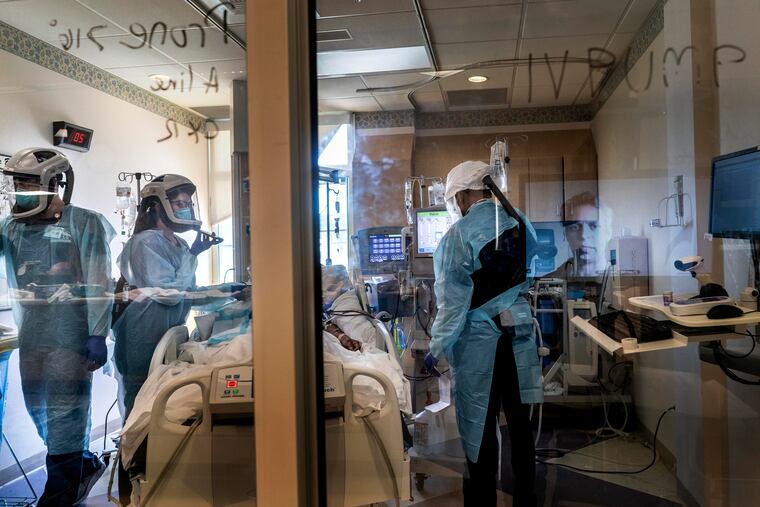Surgeons perform first known U.S. lung transplant for coronavirus patient
A former covid-19 patient has received a double-lung transplant, a surgery believed to be the first of its kind in the United States since the pandemic began, medical officials announced Thursday.

A former covid-19 patient has received a double-lung transplant, a surgery believed to be the first of its kind in the United States since the pandemic began, medical officials announced Thursday.
Northwestern Medicine in Chicago said the recipient, a woman in her 20s who would not have survived without the transplant, is in intensive care recovering from the operation and from two previous months on lung and heart assistance devices.
Ankit Bharat, chief of thoracic surgery and surgical director of Northwestern's lung transplant program, said organ transplantation may become more frequent for victims of the most severe forms of covid-19. The disease caused by the new coronavirus most commonly attacks the respiratory system but also can inflict damage on kidneys, hearts, blood vessels and the neurological system.
"I certainly expect some of these patients will have such severe lung injury that they will not be able to carry on without transplant," said Bharat, who performed the operation Friday. "This could serve as a lifesaving intervention."
Surgeons in Austria on May 26 performed the world's first known lung transplant to save the life of a covid-19 survivor, a 45-year-old woman stricken with a severe form of the disease. Bharat said he and others in his field are not aware of another organ transplant of any kind in the United States involving a recipient who had contracted the coronavirus.
The United Network for Organ Sharing, a nonprofit that coordinates transplantation in the United States, has no record of an organ transplant into a covid-19 patient as of May 29, spokeswoman Anne Paschke said. However, hospitals have two months from the date of surgery to report a transplant to the Richmond organization, she said.
The United States has suffered a severe shortage of transplant organs for many years, with more than 100,000 people on waiting lists for kidneys, livers, lungs, hearts and other organs. During the worst weeks of the pandemic in March, the numbers of transplants dipped even more, UNOS statistics show.
But the picture has improved in recent weeks, and because the number of transplants performed in 2020 was ahead of 2019's pace before the pandemic began, the totals for the two years are comparable, the statistics show.
» FAQ: Your coronavirus questions, answered.
Bharat's patient, who has not been publicly identified, was on immunosuppressant medication for a previous condition when she contracted the coronavirus, he said. Perhaps for that reason, the virus devastated her lungs, leaving physicians few options. She developed secondary bacterial infections that could not be controlled by antibiotics because her lungs were so badly damaged, he said.
"They develop these strange holes in the lungs," Bharat said. "If you were to cut the lung, it kind of resembles a Swiss cheese."
As the woman's lungs deteriorated, her heart also began to fail, followed by other organs that were not receiving enough oxygen. She was placed on a mechanical ventilator to help her breathe and later an extracorporeal membrane oxygenation device, which adds oxygen to blood outside the body and helps the heart pump blood through vessels.
Doctors repeatedly tested fluid from her lungs to be certain she was negative for the coronavirus before operating, Bharat said. By that time, she was even sicker, he said.
"This is one of the toughest transplants I've done," he said. "This was truly one of the most challenging cases."
The woman spent just two days on the waiting list before an appropriate brain-dead lung donor was found, Bharat said. Only a small percentage of donor lungs meet the standards for transplantation, and at first, the woman's physicians were not sure these would qualify, Bharat said. But the Northwestern program was able to work with the donor's lungs to make them suitable, he said.
The woman, who is now breathing through a tube inserted in her trachea, is awake, eating and communicating with family via a cellphone, he said. Her other organs have recovered, and her long-term prognosis is good, Bharat said, but she faces a long rehabilitation.
The median life of a double-lung transplant is about nine years before the organs must be replaced, but experts have seen transplanted lungs function much longer, he said. The recipient is covered by private insurance for most of her transplant and hospitalization costs, he said.